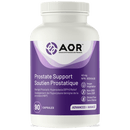Highlights
Benign prostatic hyperplasia (BPH) relief
- Reduces the size and relieves symptoms of an enlarged prostate (BPH)
- Reduces discomfort associated with prostate inflammation
- Lowers PSA levels
- A carefully crafted blend of pollen extracts
Details
Prostate Support is a product designed to relieve symptoms of benign prostatic hyperplasia (BPH). Its main ingredient is defined pollen extract, which is not the same thing as bee pollen. Bee pollen is a random mixture of whatever pollens the insects happen to have come into contact with, while defined pollen extract is a very specific mixture of pollens from several cereal grasses in particular.
Prostate Support has been clinically shown to reduce the enlarged prostate and lower levels of PSA (prostate-specific antigen), an indicator of both BPH and of prostate cancer. Other natural therapies used for prostate issues such as saw palmetto and others merely relieve the symptoms of BPH without reducing the size of the prostate. Unlike these herbs, defined pollen extract addresses the fundamental problem by reducing the size of the enlarged prostate, an effect that has not been demonstrated by any other herbal remedy. Prostate Support is also a powerful anti-inflammatory, bringing relief for those who suffer from painful conditions such as prostatodynia and prostatitis.
Research suggests that defined pollen extract can also support detoxification and liver protection. Furthermore, in some parts of the world, the extract is used by more women than men because they have found the extract to be useful for the relief of urinary incontinence.
AOR Advantage
Men who suffer from the uncomfortable urinary symptoms of BPH or the pain of inflammatory prostate conditions, and women suffering from urinary incontinence, can benefit greatly from taking AOR’s Prostate Support.
Ingredients & Suggested Use

Adult Dosage
Take one capsule three times daily with/without food, or as directed by a qualified health care practitioner. Use for a minimum of 12 weeks to see beneficial effects.
Cautions
Do not use if you are allergic to flower pollen. Consult a health care practitioner prior to use to exclude a diagnosis of prostate cancer or if symptoms persist or worsen with use. May cause mild gastrointestinal discomfort or nausea. Hypersensitivity has been known to occur; in which case, discontinue use.
Research
Proven in Controlled Trials
In one study, sixty men with symptomatic BPH received either the pollen extract or placebo for six months. Sixty-nine percent of men receiving the pollen extract experienced improved overall symptoms, compared to less than a third of the placebo group. There were statistically significant differences in the number of incidences of nocturia, decreased leftover urine in the bladder after urination (“residual urine volume”). Compared to the placebo group, there were also more improvements reported by men receiving the pollen extract in hesitancy (inability to release urinary flow) and intermittency, but these results were not strong enough, in this small a group over this short a period, to be statistically meaningful. But most importantly, this study reported that men using defined pollen extract experienced significant reductions in the volume of the prostate as measured by ultrasound. In fact, every trial of defined pollen extract in men with BPH, which has measured prostate volume, size, or weight has reported significant reductions in the gland.
Another study administered defined pollen extract to men with BPH for 3 months, while some men continued with the treatment for a year. Flow rate and residual volume improved significantly after 3 months, while the7 cm3 reduction in prostate size was not noticeable until 1 year. This means that the symptoms improved in the first few months but the prostate size began to shrink sometime between 3 months and 1 year.
A double-blind, placebo-controlled trial in 100 men with BPH found that defined pollen extract improved nocturia in 69% of the men compared to 37% of those taking the placebo. After 6 weeks, peak urine flow rate was 3.3ml/sec for the pollen group and 0.9ml/sec for the placebo group. In the pollen group, residual urine volume continually decreased over 12 weeks; the placebo group actually experienced an increase between 6 and 12 weeks.
Prostatitis
Over 2000 men with either prostatitis, BPH, or the two combined were given defined pollen extract for 12 weeks. Prostate size, flow rate, residual volume, and leukocyte presence (an inflammatory marker) decreased in all groups.
Defined Pollen Extract vs Pygeum africanum
Defined pollen extract has been found superior to Pygeum africanum, another common prostate supplement. A study compared the effects of Cernilton, a defined pollen extract, against Pygeum africanum for 4 months in about 90 men with BPH. 78% of the men taking the pollen extract reported symptom relief while only 55% did in the Pygeum group. The Cernilton group experienced increases in flow rate and decreases in residual urine and in prostate volume.
Defined Pollen Extract vs Paraprost
When these two prostate products were compared in about 160 men with BPH over 4 weeks, both the subjects and the physicians evaluated defined pollen extract as slightly more effective than Paraprost. Paraprost is a mixture of three amino acids.
Defined Pollen Extract vs Beta-Sitosterol
In a comparative study, subjective symptoms improved more with the pollen extract, and the latter also reduced prostate alkaline phosphatase (PAP) and prostate-specific antigen (PSA), markers of prostate lesions, while beta-sitosterol did not reduce these markers.
Saw Palmetto
The effectiveness of saw palmetto for prostate problems has become controversial. While some studies have shown some reduction in symptoms, others have not. The most recent trial, a dose-escalation study which was implemented due to a lack of significant findings in a large study, administered up to 960 mg of saw palmetto over 72 weeks. They found that saw palmetto didn’t lower PSA levels.
Payment & Security
Your payment information is processed securely. We do not store credit card details nor have access to your credit card information.


